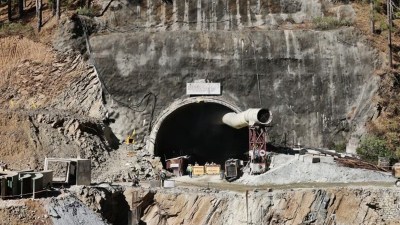Where146;s Tony?
Where8217;s tony? The search for former British Prime Minister Tony Blair hasn8217;t been enshrined in a children8217;s book...

Where8217;s tony? The search for former British Prime Minister Tony Blair hasn8217;t been enshrined in a children8217;s book or computer game yet, but don8217;t rule it out. Seldom has a world-class politician seemed to disappear so swiftly and without a trace. Since he resigned from office in June after 10 glittering and controversial years in power, the leader once hailed as one of Britain8217;s most influential postwar prime ministers has become a nonperson.
But don8217;t let the Blair jokes fool you. It8217;s true that at the Conservatives8217; annual conference last week the words 8220;heir to Blair8221; no longer passed the lips of those who once upon a time hopefully compared their young, dynamic leader, David Cameron, to the ex prime minister. It8217;s true, too, that Blair seemed to have been erased from the memory banks of Labour delegates at their conference the week before; Brown made a single, fleeting reference to you-know-who in his big speech. Nonetheless, the idea that Blair has been consigned to the dustbin of history is misleading. With rumours flying that Brown might call a snap election in a few weeks, whisper it: Blair is dead, but Blairism 8212; the political ideology with which he ruled his party and his country 8212; lives on.
Indeed, Blair8217;s politics live on most vividly in Brown himself. It8217;s uncanny the way the new prime minister has both killed Blair and shamelessly assumed his mantle. He8217;s amassed impressive popular support as the anti-Blair with a serious, nonflashy style that sets him apart from Blair, whose presentational pizzazz came to be deplored as spin by an electorate that turned angry after the invasion of Iraq. And yet, like Blair before him, he8217;s continued to develop hard-line policies on such issues as immigration and crime. He8217;s proposed locking up for five years anybody in illegal possession of a gun, for example. Such measures help to tighten Labour8217;s hold on the political centre ground that was so key to the party8217;s Blair-led landslide in 1997. 8220;It8217;s very clear that Brown is determined to continue being a New Labour politician,8221; says Blair8217;s erstwhile ideologist-in-chief, the sociologist Anthony Giddens.8220;You8217;ve got to grasp the centre ground, and his strategy is to squeeze the Tories out toward the edges.8221;
This should not come as a surprise, even to those who suspect Brown is a closet socialist. Brown and Blair, despite the Cain-and-Abel-like rivalry that damned their personal relationship, were co-architects of New Labour. If on the one hand Brown sometimes seems more egalitarian in his policies than Blair, he has, on the other hand, pushed a tougher, more populist agenda, using nativist-sounding language 8220;British jobs for British people8221; that Blair in his later days would not have gotten away with. Blair8217;s role in the Iraq War cost him the support of large chunks of his party, making it harder for him to drive through controversial policies. Brown, however, still basks in the honeymoon of his leadership, granting him a de facto mandate to do what would otherwise be politically risky. When Brown last week announced withdrawals that would reduce the British presence in Iraq to 4,500 troops by the end of the year, the move was warmly received 8212; but Blair was on course to do the same thing had he remained in office.
If Blair seems to have vanished, it8217;s partly because Britons weary of a war they see as a failure were hugely relieved to see him go. But it8217;s also because so many politicians have converged on the Blairite centre ground that Blair is simply crowded out. In the political mainstream, the lunge to the centre is universal. Blair once embraced Margaret Thatcher8217;s market reforms to move his party rightward. Ditto Brown, who recently invited to tea the very same Iron Lady he once derided for her 8220;far-right, far-fetched, far-out dogma.8221; The same goes for Cameron, who seeks to prod his party to the left by embracing a green agenda. Among electable politicians these days, it sometimes seems everybody is everybody else8217;s heir, and some of the credit for that must go to one Anthony Charles Lynton Blair, wherever he may be.
- 01
- 02
- 03
- 04
- 05































